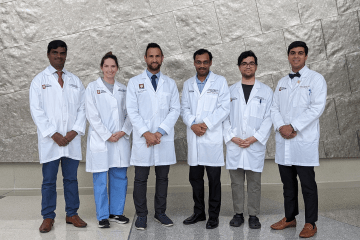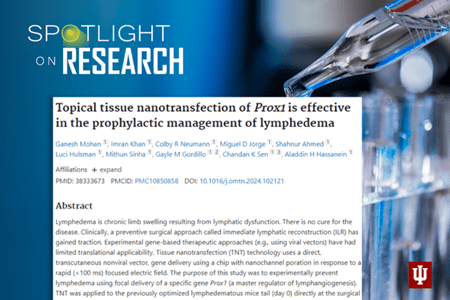INDIANAPOLIS — Lymphedema, a debilitating condition affecting 250 million individuals globally, has long been a medical puzzle with no definitive solution. However, recent strides in research spearheaded by Dr. Al Hassanein and his team offer a glimmer of hope for those afflicted by this chronic limb swelling. Their recent study, published in Molecular Therapy-Nucleic Acids, introduces a novel approach utilizing tissue nanotransfection (TNT) technology to administer gene therapy directly to the site of lymphatic injury to prevent lymphedema from occurring potentially revolutionizing lymphedema management.
Unveiling the Key to Lymphangiogenesis with Prox1
Hassanein and his colleagues focused on the transcription factor Prox1, a key player in lymphangiogenesis, the formation of lymphatic vessels. By employing tissue nanotransfection (TNT) technology, a non-viral vector gene delivery system, they were able to deliver Prox1 to the affected area, effectively preventing lymphedema development in a murine model. Notably, their approach resulted in decreased swelling as well as lymphatic clearance, highlighting the therapeutic potential of Prox1 delivered through nanotransfection (TNT).
"Our study shows that lymphedema can be prevented with a focal application of targeted gene therapy through the skin at the time of lymphatic injury. We are now working on finding precise targets for tissue nanotransfection in patients to translate this clinically. We are focused on ultimately helping patients with lymphedema or at high risk for getting lymphedema with a focal therapy applied through the skin to preserve their lymphatic system."
Hope on the Horizon
The significance of Hassanein's research lies not only in its promising results but also in its potential clinical implications. Lymphedema, often a consequence of cancer treatment, poses significant challenges to patients' quality of life and imposes a substantial healthcare burden. Current treatment options, while providing some relief, fall short of addressing the underlying cause and are often limited in efficacy. The novel approach offers a paradigm shift by prophylactically intervening during the initial lymphatic injury which causes lymphedema and providing a potential avenue for prevention rather than just symptom management.
Bridging Practice to Research
Hassanein's dedication to this field stems from his firsthand experience with patients grappling with lymphedema. As a plastic surgeon specializing in breast cancer reconstruction, he has witnessed the profound impact of lymphedema on his patients' lives. His passion for finding a solution drove him to delve into research, culminating in the pursuit of topical treatments aimed at directly addressing the underlying mechanisms of lymphatic dysfunction.
"As a reconstructive plastic surgeon who focuses on breast cancer reconstruction and lymphedema, I see patients with lymphedema that come from throughout the state of Indiana. Although there are surgical procedures that can help them, there is no cure for lymphedema, and it can be a difficult, frustrating condition for them that affects their quality of life. Their lymphedema is a traumatic reminder of their battle with cancer and can profoundly affect their function. We want these patients to be able to win their battle with cancer with a permanent physical reminder that still affects them."
The recent accolades received by Dr. Hassanein, including NIH grants totaling over $1 million, emphasize the significance of his research and its potential to transform clinical practice. His NIH K08 grant, awarded in April 2023, and NIH R21 grant, received in September 2023, as well as an earlier grant from the Department of Defense, provided crucial support for further advancing his work and translating it into potential benefits for patients tackling lymphedema.
The Team Behind the Breakthrough

Hassanein and his research colleagues are pioneering a novel approach, offering a beacon of hope for millions globally. Through the utilization of advanced technology and steadfast commitment, they are forging a path towards a future where lymphedema ceases to be an insurmountable obstacle, instead becoming a condition that can be effectively managed.
"We have a great team with my collaborators Dr. Mithun Sinha and Dr. Ganesh Mohan, as well as other vital members of the laboratory, including Dr. Shahnur Ahmed, who are driving our progress forward. We hope to identify precise gene targets in patients to decrease the inflammation that causes lymphedema as well as grow new lymphatics."
For more information on Dr. Al Hassanein and his labs research and the recent publication detailing these novel findings, please visit PubMed.
